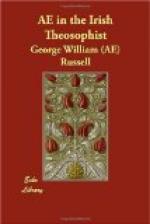“You will find these thoughts will hinder you much,” he said.
“You mean—” I hesitated, half-bewildered, half-amazed. “I say that a thought such as that which flamed about you just now, driving your sadness away, will recur again when next you are despondent, and so you will accustom yourself to find relief on the great quest by returning to an old habit of the heart, renewing what should be laid aside. This desire of men and women for each other is the strongest tie among the many which bind us: it is the most difficult of all to overcome. The great ones of the earth have passed that way themselves with tears.”
“But surely, Merodach, you cannot condemn what I may say is so much a part of our nature—of all nature.”
“I did not condemn it, when I said it is the strongest tie that binds us here: it is sin only for those who seek for freedom.”
“Merodach, must we then give up love?”
“There are two kinds of love men know of. There is one which begins with a sudden sharp delight—it dies away into infinite tones of sorrow. There is a love which wakes up amid dead things: it is a chill at first, but it takes root, it warms, it expands, it lays hold of universal joys. So the man loves: so the God loves. Those who know this divine love are wise indeed. They love not one or another: they are love itself. Think well over this: power alone is not the attribute of the Gods; there are no such fearful spectres in that great companionship. And now, farewell, we shall meet again.”
I watched his departing figure, and then I went on my own way. I longed for that wisdom, which they only acquire who toil, and strive, and suffer; but I was full of a rich life which longed for excitement and fulfilment, and in that great Babylon sin did not declare itself in its true nature, but was still clouded over by the mantle of primeval beauty.
—December 15, 1893
The Cave of Lilith
Out of her cave came the ancient Lilith; Lilith the wise; Lilith the enchantress. There ran a little path outside her dwelling; it wound away among the mountains and glittering peaks, and before the door, one of the Wise Ones walked to and fro. Out of her cave came Lilith, scornful of his solitude, exultant in her wisdom, flaunting her shining and magical beauty.
“Still alone, star gazer! Is thy wisdom of no avail? Thou hast yet to learn that I am more powerful knowing the ways of error than you who know the ways of truth.”
The Wise One heeded her not, but walked to and fro. His eyes were turned to the distant peaks, the abode of his brothers. The starlight fell about him; a sweet air came down the mountain path, fluttering his white robe; he did not cease from his steady musing. Like a mist rising between rocks wavered Lilith in her cave. Violet, with silvery gleams her raiment; her face was dim; over her head rayed a shadowy diadem, the something a man imagines over the head of his beloved—–looking closer at her face he would have seen that this was the crown he reached out to, that the eyes burnt with his own longing, that the lips were parted to yield to the secret wishes of his heart.




